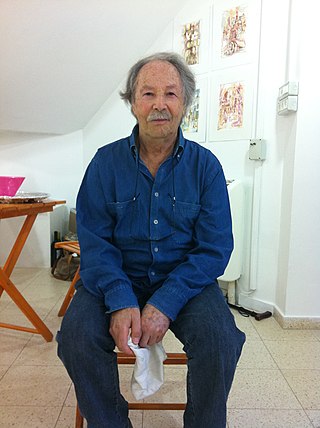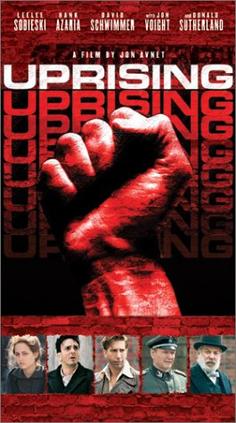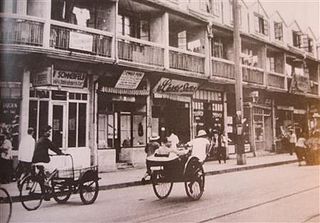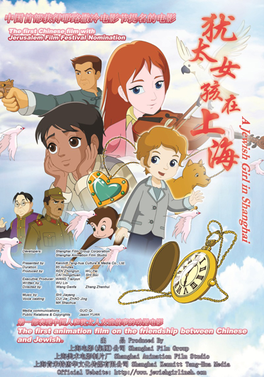
The Great Dictator is a 1940 American anti-fascist, political satire, and black comedy film written, directed, produced, scored by, and starring British filmmaker Charlie Chaplin. Having been the only Hollywood filmmaker to continue to make silent films well into the period of sound films, Chaplin made this his first true sound film.

A ghetto is a part of a city in which members of a minority group are concentrated, especially as a result of political, social, legal, religious, environmental or economic pressure. Ghettos are often known for being more impoverished than other areas of the city. Versions of such restricted areas have been found across the world, each with their own names, classifications, and groupings of people.

Uri Orlev born Jerzy Henryk Orłowski, was a Polish-born Israeli children's author and translator. He received the Hans Christian Andersen Award in 1996 for his "lasting contribution to children's literature", the Prime Minister's Prize for Hebrew Literary Works in 1972 and the Bialik Prize for literature in 2006.

Uprising is an American 2001 war drama television film about the Warsaw Ghetto Uprising during the Holocaust. The film was directed by Jon Avnet and written by Avnet and Paul Brickman. It was first aired on the NBC television network over two consecutive nights in November 2001.

The Pianist is a 2002 biographical film produced and directed by Roman Polanski, with a script by Ronald Harwood, and starring Adrien Brody. It is based on the autobiographical book The Pianist (1946), a memoir by the Polish-Jewish pianist, composer and Holocaust survivor Władysław Szpilman. The film was a co-production by France, the United Kingdom, Germany and Poland.
Recorded Jewish history in the Philippines started during the Spanish period.

The Island on Bird Street is a 1981 semi-autobiographical children's book by Israeli author Uri Orlev, which tells the story of a young boy, Alex, and his struggle to survive alone in a ghetto during World War II. The author won the 1996 Hans Christian Andersen Award for children's literature, largely for this book, which was translated into numerous languages and adapted into a play and a film. The English translation, by Hillel Halkin, was published in 1984.

Jacob the Liar is a 1969 novel written by the East German Jewish author Jurek Becker. The German original title is Jakob der Lügner. Becker was awarded the Heinrich-Mann Prize (1971) and the Charles Veillon Prize (1971) after the publication of his bestseller.

The Shanghai Ghetto, formally known as the Restricted Sector for Stateless Refugees, was an area of approximately one square mile (2.6 km2) in the Hongkou district of Japanese-occupied Shanghai. The area included the community around the Ohel Moshe Synagogue. Shanghai was notable for a long period as the only place in the world that unconditionally offered refuge for Jews escaping from the Nazis. After the Japanese occupied all of Shanghai in 1941, the Japanese army forced about 23,000 of the city's Jewish refugees to be restricted or relocated to the Shanghai Ghetto from 1941 to 1945 by the Proclamation Concerning Restriction of Residence and Business of Stateless Refugees. It was one of the poorest and most crowded areas of the city. Local Jewish families and American Jewish charities aided them with shelter, food, and clothing. The Japanese authorities increasingly stepped up restrictions, surrounded the ghetto with barbed wire, and the local Chinese residents, whose living conditions were often as bad, did not leave. By 21 August 1941, the Japanese government closed Shanghai to Jewish immigration.
Joyce Chao or Chao Hung-chiao is a Taiwanese actress, singer and television host. She was a member of Taiwanese female group 7 Flowers. During years in school, her friends introduced her to a model company. After graduation, she entered Jungiery. She was cast in the film Shanghai Ghetto, a love story between a Jewish Refugee and a Chinese woman during World War Two. She played the role of Alice Chen, a friend of the protagonist.
Sir Horace Kadoorie, CBE was an industrialist, hotelier, and philanthropist. He was a member of the Kadoorie family.
Amir Mann is an Israeli film-maker. Mann attended the Tisch School of the Arts at New York University. He met his future wife Dana Janklowicz-Mann while at NYU. Together they formed Rebel Child Productions, an independent film production company and became filmmaking partners.

POLIN Museum of the History of Polish Jews is a museum on the site of the former Warsaw Ghetto. The Hebrew word Polin in the museum's English name means either "Poland" or "rest here" and relates to a legend about the arrival of the first Jews to Poland. Construction of the museum in designated land in Muranów, Warsaw's prewar Jewish quarter, began in 2009, following an international architectural competition won by Finnish architects Rainer Mahlamäki and Ilmari Lahdelma.

Josef Albert Meisinger, also known as the "Butcher of Warsaw", was an SS functionary in Nazi Germany. He held a position in the Gestapo and was a member of the Nazi Party. During the early phases of World War II Meisinger served as commander of Einsatzgruppe IV in Poland. From 1941 to 1945 he worked as liaison for the Gestapo at the German embassy in Tokyo. He was arrested in Japan in 1945, convicted of war crimes and was executed in Warsaw, Poland.

A Jewish Girl in Shanghai is a 2010 Chinese animated family film written by Wu Lin and based on his graphic novel of the same name. It is directed by Wang Genfa and Zhang Zhenhui, and voiced by Cui Jie, Zhao Jing and Ma Shaohua.

The Shanghai Jewish Refugees Museum is a museum commemorating the Jewish refugees who lived in Shanghai during World War II after fleeing Europe to escape the Holocaust. It is located at the former Ohel Moshe or Moishe Synagogue, in the Tilanqiao Historic Area of Hongkou district, Shanghai, China. The museum features documents, photographs, films, and personal items documenting the lives of some of the more than 20,000 Jewish residents of the Restricted Sector for Stateless Refugees, better known as the Shanghai Ghetto, during the Japanese occupation of Shanghai.
A Child of the Ghetto is a Biograph silent film directed by D. W. Griffith in 1910. The story features a seamstress in New York City.
Although Japan was a member of the Axis, and therefore an ally of Nazi Germany, it did not actively participate in the Holocaust. Anti-semitic attitudes were insignificant in Japan during World War II and there was little interest in the Jewish question, which was seen as a European issue. Furthermore, Nazi Germany did not pressure Japan on the issue.












